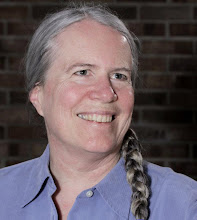Teaching, Authority, and the Internet
I wrote
AKMA some thoughts about his
Disseminary proposal, and then thought I would share them here because writing about it helped me think both about my own call and about teaching with information technology. When I get a little time I need to start to draw some conclusions from my experience this semester teaching lap-top required courses, particularly for the first time a large class (80 students).
1. As I think about my own call and whether it makes any sense for me to go to seminary, I would very much like a place where I could read scholarship, reflections and new ideas of the sort that I would experience in seminary. I walked into a new Sunday School class in my church at the beginning of the fall, and one of the organizers said: "Oh, no, a college professor." I'm hungry for places where I can be intellectually challenged and can start to build bridges between my intellectual world and my internal faith experience.
2. I would love to be a part of a community of people wondering about attending seminary. In my small town and spread-out diocese I don't know of anyone else, and I'm still in the stage where I am afraid if I talk about it to people they will think I am foolish. Certainly a community would help me discern and develop my dream.
3. The Internet has the potential to transform the processing of teaching in ways we must think carefully about. Its great strength is the opportunity it gives students to learn independently, to share ideas, and to publish their work. That is, it helps build community and gives students more opportunities to take responsibility for their own learning. This proposal takes advantage of those opportunities both by making information available to learners and also by blurring the roles of teachers and learners. Teachers who aren't giving a grade don't have the same kind of authority over learners; learners are coming for what they want. In my own teaching I would most like to encourage my students to be exploratory learners, but it is hard to get them out of the focus on what will be on the test. I would love to see a site that had not just discussion boards and the opportunity for outsiders to submit material to go on the site, but also some way that groups of teachers and learners could write white papers on various issues that would be products of group thinking and discussion and would be posted to the site. I think it could be a tremendously interesting group learning experience.
4. As the Internet gives students a more visible voice, we must think more deeply about the balance between professional knowledge (the authority of the teacher) and what students already know from their own experience. I actually think a seminary context is a wonderful place to explore this aspect of the impact of information technology on education because seminaries have to take seriously the inner life of the student in a way that other educational settings can avoid. The opportunity here is to bring seminary professors together on an equal basis with people who are interested in similar issues. The learners want to gain the perspective that scholarship can provide, but they aren't students coming to be socialized into a professional role that ends in a degree. I would hope that the professional authority of the seminary professors and the
authority that the learners have from their own life experience could meet on a more equal basis. Think of what a model this could be--can you imagine doctors sharing on an equal basis say with the parents of kids with learning disabilities in a discussion of what works and what doesn't work? It is much easier to imagine such sharing in a seminary setting than a medical one.





